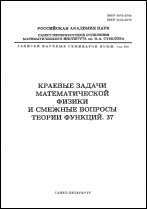|
|
Zapiski Nauchnykh Seminarov LOMI, 1988, Volume 174, Pages 3–36
(Mi znsl4510)
|
|
|
 |
This article is cited in 1 scientific paper (total in 1 paper)
Solving systems of polynomial inequalities over real closed fields in subexponential time
N. N. Vorobjov (Jr.), D. Yu. Grigor'ev
Abstract:
Let $\mathbb{Q}_m$ denote the field $\mathbb{Q}(\delta_1,\dots,\delta_m)$, where $m\geqslant1$,
$\mathbb{Q}_0=\mathbb{Q}$ and an element $\delta_m$ is infinitesimal relatively to the
elements of the field $\mathbb{Q}_{m-1}$, i.e. $0<\delta_m<a$ for any
$0<a\in\mathbb{Q}_{m-1}$. Denote by $\widetilde{\mathbb{Q}}_m$ the real closure of $\mathbb{Q}_m$.
A subexponential-time algorithm is described for finding solutions
in $\widetilde{\mathbb{Q}}_m$ of a system of polynomial inequalities. In the case
$m=0$ (i.e. $\mathbb{Q}_m=\mathbb{Q}$), exponential-time procedures were designed
for this problem ([4], [16], [20]). Finally, in [3], [21]
the authors proposed subexponential-time algorithm for $m=0$.
Let
$$
f_1>0,\dots,f_{k_1}>0, f_{k_1+1}\geqslant0,\dots,f_k\geqslant0 \qquad{(1)}
$$
be the input system where polynomials $f_1,\dots,f_k\in\mathbb{Q}_m[X_1,\dots,X_n]$.
Denote by $V\subset(\widetilde{\mathbb{Q}}_m)^n$ the set of all solutions of (1). For a rational
function $\alpha=\alpha_1/\alpha_2\in\mathbb{Q}_m(X_1,\dots X_n)$ where polynomials
$\alpha_1,\alpha_2\in\mathbb{Z}[\delta_1,\dots,\delta_m][X_1,\dots,X_n]$ denote by $l(\alpha)$ the maximum bit lengths
of the integer coefficients of $\alpha_1$, $\alpha_2$. Suppose, that the following inequalities are valid:
$$
\mathrm{deg}_{\delta_1,\dots,\delta_m}(f_i)<d_0,\quad \mathrm{deg}_{X_1,\dots,X_n}(f_i)<d,\quad l(f_i)\leqslant M,\quad1\leqslant i\leqslant k. \qquad{(2)}
$$
The notation $h_1\leqslant\mathcal{P}(h_2,\dots,h_t)$ for functions $h_1>0,\dots,h_t>0$
means that for suitable natural numbers $p$, $q$ an inequality
$h_1\leqslant p(h_2\cdots h_t)^q$ is true.
THEOREM. There is an algorithm which for system (1), satisfying (2),
produces $a$ finite set $\mathcal{J}\subset V$ having nonempty intersection
with each component of connectivity of $V$, with the number
of points in $\mathcal{J}$ not exceeding $\mathcal{P}((kd)^{n^2})$. The running time of
the algorithm is less than $\mathcal{P}(M,((kd)^n d_0)^{m+n})$. For every point
$(\xi_1,\dots,\xi_n)\in\mathcal{J}$ the algorithm constructs an irreducible over $\mathbb{Q}_m$
polynomial $\Phi\in\mathbb{Q}_m[Z]$, and the expressions
$\xi_i=\xi_i(\omega)=\sum\limits_{0\leqslant j<\mathrm{deg}(\Phi)}\alpha_j^{(i)}\omega^j\in\mathbb{Q}_m[\omega]$,
where $\alpha_j^{(i)}\in\mathbb{Q}_m$ ($1\leqslant i\leqslant n$) and
$\omega\in\widetilde{\mathbb{Q}}_m$, $\Phi(\omega)=0$. The constructed polynomials and expressions
satisfy the following bounds: $\mathrm{deg}_{\delta_1,\dots,\delta_m,X_1,\dots,X_n}(\Phi)\leqslant d_0\mathcal{P}((kd)^n)$;
$l(\Phi)$, $l(\xi_j(\omega))\leqslant(M+md_0)\mathcal{P}((kd)^n)$. Besides that, in the case $m=0$, the
algorithm produces a pair of rational numbers $b_1,b_2\in\mathbb{Q}$ such
that inside the interval $(b_1,b_2)\subset\mathbb{R}$ there is a unique real root
$\omega\in(b_1,b_2)$ of $\Phi$, herewith $l(b_1), l(b_2)\leqslant M\mathcal{P}((kd)^n)$.
Citation:
N. N. Vorobjov (Jr.), D. Yu. Grigor'ev, “Solving systems of polynomial inequalities over real closed fields in subexponential time”, Computational complexity theory. Part 3, Zap. Nauchn. Sem. LOMI, 174, "Nauka", Leningrad. Otdel., Leningrad, 1988, 3–36; J. Soviet Math., 55:2 (1991), 1519–1540
Linking options:
https://www.mathnet.ru/eng/znsl4510 https://www.mathnet.ru/eng/znsl/v174/p3
|

|




 Contact us:
Contact us: Terms of Use
Terms of Use
 Registration to the website
Registration to the website Logotypes
Logotypes







 Citation in format
Citation in format 
